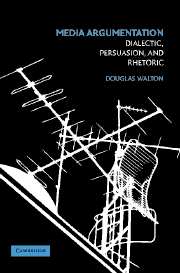Book contents
- Frontmatter
- Contents
- Acknowledgments
- Introduction
- 1 Logic, Dialectic, and Rhetoric
- 2 The Speech Act of Persuasion
- 3 Propaganda
- 4 Appeals to Fear and Pity
- 5 Ad Hominem Arguments in Political Discourse
- 6 Arguments Based on Popular Opinion
- 7 Fallacies and Bias in Public Opinion Polling
- 8 Persuasive Definitions and Public Policy Arguments
- 9 The Structure of Media Argumentation
- Bibliography
- Index
- Plate section
3 - Propaganda
Published online by Cambridge University Press: 05 June 2012
- Frontmatter
- Contents
- Acknowledgments
- Introduction
- 1 Logic, Dialectic, and Rhetoric
- 2 The Speech Act of Persuasion
- 3 Propaganda
- 4 Appeals to Fear and Pity
- 5 Ad Hominem Arguments in Political Discourse
- 6 Arguments Based on Popular Opinion
- 7 Fallacies and Bias in Public Opinion Polling
- 8 Persuasive Definitions and Public Policy Arguments
- 9 The Structure of Media Argumentation
- Bibliography
- Index
- Plate section
Summary
A recurring problem for the normative analysis and evaluation of mass media argumentation is the use of the term “propaganda.” One of the most common forms of attack on, or negative criticism of, rhetorical argumentation used in mass media is to label it as propaganda. What frequently happens is that arguments are automatically dismissed as irrational or fallacious, as soon as they are categorized as propaganda. This form of dismissal is especially evident in textbooks on logic and critical thinking, where forms of argument are frequently evaluated as fallacious using the term “propaganda.” In this chapter, I critically question such a policy of automatic dismissal of arguments used in propaganda. I will seek out a better method of evaluating such arguments, so that evaluations can be supported or refuted on a case-by-case basis by employing clearly stated criteria that can be used to assess the textual evidence given in the particular case. This method could be called an evidence-based approach.
One of the thorniest problems is to define the term “propaganda” or at least to grapple with the contradictions that appear in its current usage. One of the results of this chapter is a proposed set of criteria for the identification of propaganda as a type of discourse. Ten defining characteristics (as well as several other typical properties) of propaganda as an identifiable type of discourse will be set out and argued for.
- Type
- Chapter
- Information
- Media ArgumentationDialectic, Persuasion and Rhetoric, pp. 91 - 126Publisher: Cambridge University PressPrint publication year: 2007
- 1
- Cited by



